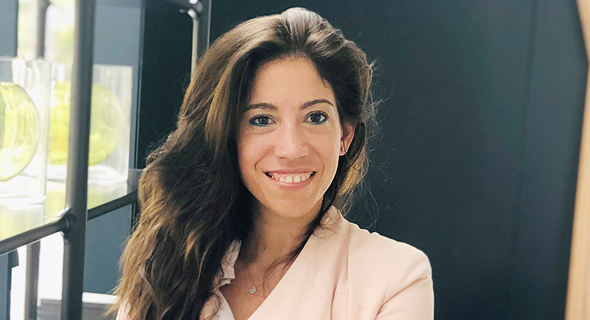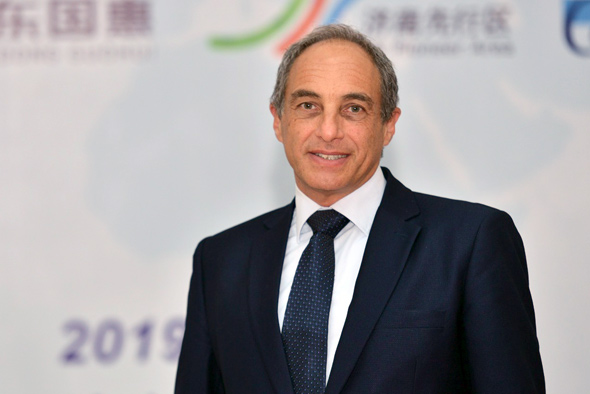Interview
“To get the investors’ trust I need to be the best of the best”
Lisya Bahar Manoah, General Partner at Catalyst, shares with CTech where the fund is looking to invest and how a degree in industrial engineering helps in the boardroom
09:2218.09.21
“We are going to invest up to $15 million each in Israeli-related companies in smart mobility, energy, cyber tech, and biotech sectors,” said Lisya Bahar Manoah, General Partner at Catalyst Funds, who has over 15 years of experience, including several major deals, under her belt. The Turkish-born Israeli led operational due diligence for Keter’s $1.7 billion acquisition by BC Partners and managed post-acquisition integration, as well as served as the Global Risk Manager at ADAMA Agricultural Solutions before joining Catalyst.
 Lisya Bahar Manoah, General Partner at Catalyst Funds. Photo: Courtesy
Lisya Bahar Manoah, General Partner at Catalyst Funds. Photo: Courtesy “At the end of 2013 Catalyst decided only to invest in growth-stage companies, Series B plus, we had enough opportunity to find it in Israeli sectors,” Bahar Manoah (38) explained. “We put more emphasis on smart mobility, energy, cyber tech, biotech, and pharma sectors. These are the sectors that we believe, during the next few years, we need to invest in more.
“The growth acceleration in smart mobility and biotech companies is immense and is impacting our funds directly. Two of our portfolio companies are already trading on Wall Street and another is expected to go public. In the coming months, Arbe will be going public on Nasdaq, which is very exciting,” she said about the company that develops 4D-imaging radar for autonomous driving. “A couple of years ago, if you would ask me about smart mobility I would have talked to you about sensors or cameras. What is interesting is that today I am only talking about energy or smart communication between cars, these are the trends today and where we are going to invest.”
Bahar Manoah’s diverse interest and knowledge of smart mobility and agrotech, as well as cybersecurity, life science, and adtech, did not come from thin air. When she was 18, she traded her hometown of Istanbul for Vienna, where she earned her Master’s in Industrial Engineering. “The most important thing for me is gaining people’s trust, at the end of the day they trust me with millions of dollars to maximize their profits, so to get the investors’ trust I need to be the best of the best, for me that means to understand the technology, to bring financial expertise, to bring everything at 100% to the table,” she explained.
She moved to Israel over a decade ago, in late 2010, and she lives in Tel Aviv with her husband and 3-year-old daughter. Her French-born husband Igal, who is a VP for marketing at Schneider Electric, followed Bahar Manoah to Israel and like her, made Aliyah. “I am really proud when people come here and choose to live here and do the best for Israel, this is the reason why I am here and also why I am at Catalyst,” she added.
Bahar Manoah has been with Catalyst, which was founded in 1999 by Yair Shamir and Edouard Cukierman, for almost three years. She noted the fund’s “core focus is the growth stage companies that have a direct impact and can reach an exit in three to five years,” and explained how the fund adjusted to changes in the ecosystem. “Catalyst grew with Israel. 22 years ago Israel was a start-up nation, but when you look today, you see all the unicorns that popped up this past year and their share of the global unicorns scene. We saw that coming, we saw we can trust Israeli start-ups and at the end, we knew these start-ups are going to grow and eventually will have an exit or IPO.”
When discussing the current market and ecosystem Bahar Manoah said it is a good time to be a growth investor because “we are kind of in a very good place, we know that the trend does not stop now or during the next five to seven years.” However, she pointed to the always looming challenges that could hamper local success. “The number of new start-ups is shrinking in the last two to three years, so we have to adhere to that problem and we have to take care of it now and not in ten years because we will see its impact in the next four or five years. The biggest problem we have is manpower. Today we do not have enough bioengineers, software engineers, electrical engineers.”
 Edouard Cukierman, Founding and Managing Partner at Catalyst Funds. Photo: Courtesy
Edouard Cukierman, Founding and Managing Partner at Catalyst Funds. Photo: Courtesy Like many others, Bahar Manoah speaks about better education and reaching the Israeli periphery, creating a more diverse workforce, however, she also calls to import tech talent as well as outsource. “We need to take care of the lack of manpower now because otherwise what will happen is that early-stage and growth-stage investors will not invest in Israeli or Israeli-related companies.
“Another thing I see a lot, especially while teaching at the IDC, is that a couple of years ago the students wanted to be a part of the start-up nation and were ok to go through a couple of years without money to learn as much as possible. Today is different, today they are happy to go work for Google or any company that offers good salaries or growth-stage startups. So instead of going through the startup launching path, they go and work for a global company. They do not have that patience.”
The global pandemic was another hurdle that, like everyone, Bahar Manoah and Catalyst had to clear. “For us, what is most important is that we create value for our portfolio companies and for our investors. We were able to accomplish this by focusing on strong involvement with our companies and by being able to shift strategies where the recovery has been quicker and by continuing to follow on investments,” she said about Catalyst’s strategy during the past couple of years.
Related articles:
- Study: Israeli unicorns reach $1 billion valuation in an average 6 years
- B2B social media marketing platform developer Oktopost secures $20 million investment
- Deloitte opens second cohort for Israeli growth-stage startups expanding to U.S. market
“We continue to invest, follow-on investments are important for our portfolio companies to provide them with enough runway during the difficult times. In a nutshell, we are staying focused and present.”



